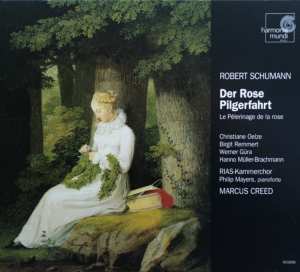|
A Folk-Oratorio
ROBERT ANDERSON
listens to a new CD of neglected Schumann
|


To listen to the aural illustrations in this review, you may need to download
RealNetworks' realplayer G2.
|
There were some who wanted Schumann to take Wagner's place at the Dresden
opera, vacated in a blaze of revolutionary fervour (1849). Instead, Schumann
decided on the Rhineland town of Düsseldorf, where a different music
was in the air. Handel had been there in 1711 seeking to lure the castrato
Baldassari to opera in London, but Schumann's duties were mainly choral
and orchestral. He had responsibility also for the Lower Rhine Festival,
founded in 1818 soon after Prussia took over the area. There was much conducting,
and Clara Schumann foresaw considerable toll: 'Ten concerts a year, four
concerts of church music, one day a week with the choral society'. Schumann
succeeded Hiller, but Mendelssohn had been there previously, producing many
Handel oratorios and writing his own St Paul for the Lower Rhine
Festival of 1836. Schumann was inexperienced as a conductor and temperamentally
unsuited to the task. Initially, the smooth working of the Hiller tradition
carried him through, even if his health was uncertain. But incompetence
on a rostrum he came to dread and increasing mental torture led step by
step to the suicide attempt in the Rhine of February 1854.
The Pilgrimage of the Rose comes within the first year at Düsseldorf,
when the Cello Concerto and 'Rhenish' Symphony were also composed. The poem
by Moritz Horn attracted Schumann at once; he saw the opportunity for a
folk-oratorio far from fugues and contrapuntal effects. (Click
to listen.) The story has elements that charm, delight and repel. A
rose desires human form to experience the wonders of love. Her wish is granted,
and all will be well so long as she guards for herself the rose flower that
remains her talisman. Happily married and nursing her first-born, she gives
the rose to the child, and joins the angels with hardly a thought for the
human husband who must now nanny the baby. The tale belongs firmly to the
mid-19th century; yet it has a disquieting relevance for today. Schumann's
24 numbers are simple in structure but charmingly expressive. He later scored
the piano accompaniment on the urging of friends, though aware that the
original was perfectly satisfactory. Only the sustained music at the end
of No.8 requires more than the piano can give. (Click
to listen.)
 It
is entertaining to compare Schumann's two versions of the work. When keyboard
figuration is transferred unchanged to the violins, the result is hardly
idiomatic and flexibility is lost. One of the main features of this fine
performance is the fact that the choir's sensitivity gets an immediate response
from Philip Mayers at the piano and vice versa. Clara Schumann was
the pianist at the first performance in July 1851; I would back Mayers as
a successful substitute. He has an advantage over her, too, that his left
hand can already pre-echo the cellos who were to take over as orchestral
bass. Much of the choral singing is quietly beautiful, unfolding the tale
with much tenderness if an occasional absence of final consonant. The chaps,
however, can respond to a hunting call with the best. The admirable Werner
Güra is both sympathetic narrator and luckless husband. (Click
to listen.) Impersonating the curmedgeonly Martha, Birgit Remmert summons
momentary harshness; for the rest she coos as any suckling dove. Hanno Müller-Brachmann
is the kindly grave-digger, an open-air Rocco, who sets the delectable Rosa
of Christiane Oelze on the first steps of her earthly pilgrimage. It is
all very well to follow Robert Herrick and gather 'rosebuds while ye may'.
He was thoroughly aware that today's smiling flower 'Tomorrow will be dying'
and that it's 'ne'er the rose without the thorn'. It
is entertaining to compare Schumann's two versions of the work. When keyboard
figuration is transferred unchanged to the violins, the result is hardly
idiomatic and flexibility is lost. One of the main features of this fine
performance is the fact that the choir's sensitivity gets an immediate response
from Philip Mayers at the piano and vice versa. Clara Schumann was
the pianist at the first performance in July 1851; I would back Mayers as
a successful substitute. He has an advantage over her, too, that his left
hand can already pre-echo the cellos who were to take over as orchestral
bass. Much of the choral singing is quietly beautiful, unfolding the tale
with much tenderness if an occasional absence of final consonant. The chaps,
however, can respond to a hunting call with the best. The admirable Werner
Güra is both sympathetic narrator and luckless husband. (Click
to listen.) Impersonating the curmedgeonly Martha, Birgit Remmert summons
momentary harshness; for the rest she coos as any suckling dove. Hanno Müller-Brachmann
is the kindly grave-digger, an open-air Rocco, who sets the delectable Rosa
of Christiane Oelze on the first steps of her earthly pilgrimage. It is
all very well to follow Robert Herrick and gather 'rosebuds while ye may'.
He was thoroughly aware that today's smiling flower 'Tomorrow will be dying'
and that it's 'ne'er the rose without the thorn'.
Copyright © Robert Anderson,
August 7th 1999
Schumann Der Rose Pilgerfahrt
(The Pilgrimage of the Rose, Op 112,
an oratorio for soloists, choir and piano,
after a poem by Moritz Horn)
Christiane Oelze
Birgit Remmert
Werner Güra
Hanno Müller-Brachmann
RIAS Chamber Choir
Philip Mayers, piano
Marcus Creed, conductor
HMC 901668 DDD 62'27
Copyright © 1999 harmonia
mundi s.a.
ORDER THIS CD FROM CROTCHET |
<< Music &
Vision homepage More CD reviews >>
|